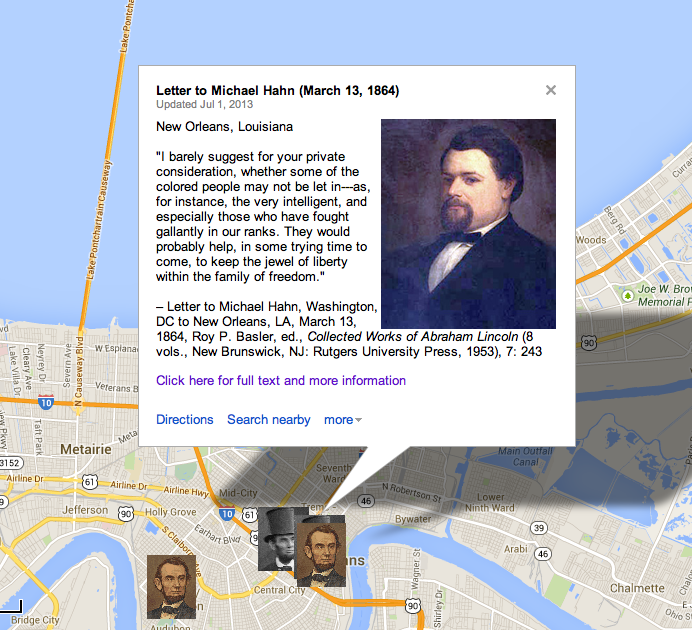Contributing Editors for this page include Adam Grant Kelley
Ranking
#72 on the list of 150 Most Teachable Lincoln Documents
Annotated Transcript
On This Date
HD Daily Report, March 13, 1864
The Lincoln Log, March 13, 1864
Close Readings
Close.Reading.Hahn from Adam Kelley on Vimeo with transcript available via Quora
Custom Map
How Historians Interpret
“A delegation who came before the president to plead the cause of loyal, black Louisianans may have made the pivotal impression on Lincoln. The group was headed by Jean Baptiste Roudanez and Arnold Bertonneau, educated mulatto Creoles and New Orleans businessmen. In their presence, Lincoln remained noncommittal, stressing the inability of the federal government to suffrage on private citizens. But the next day he wrote to loyalist Governor Michael Hahn of Louisiana, saying: ‘Now you are about to have a [constitutional] Convention which, among other things, will probably define the elective franchise. I barely suggest for your private consideration, whether some of the colored people might not be let in — as, for instance, the very intelligent and especially those who have fought gallantly in our ranks.’ As the border states had reacted to Lincoln’s suggestion of gradual emancipation, so Louisiana now responded to his suggestion of limited suffrage. Its constitutional convention failed to enfranchise any blacks but instead referred the question to the state legislature, meaning that suffrage never would be granted in Louisiana.”
— Eugene H. Berwanger, “Lincoln’s Constitutional Dilemma: Emancipation and Black Suffrage,” Journal of the Abraham Lincoln Association 5, no. 1 (1983): 25-38.
“Banks’ ‘confidence in the practicability of constructing a free state-government, speedily, for Louisiana,’ and his ‘zeal to accomplish it’ gratified Lincoln, who urged the general to ‘proceed with all possible dispatch.’ To assist Banks, Lincoln let it be known that all federal appointees in Louisiana should give the general ‘full, and zealous cooperation.’ Lincoln’s fateful decision to place Banks in charge would profoundly affect the course of reconstruction not only in Louisiana but also throughout the South. True to his word, Banks delivered a free state government in less than two months. Emboldened by his new authority, he scrapped the Free State Committee’s plan to hold a constitutional convention and mandated that on February 22 elections be held for governor and other state officials, based on the 1852 state constitution. To nullify provisions of that document sanctioning slavery, the general promulgated special orders. Michael Hahn, a Moderate, won the governorship, defeating the Radical Benjamin Flanders and the Conservative J. Q. A. Fellows. The turnout of more than 11,000 voters far exceeded the ten per cent requirement. Lincoln congratulated Hahn for ‘having fixed your name in history as the first-free-state Governor of Louisiana.’ Five weeks later, 6,000 voters participated in the election of delegates to a constitutional convention, which met from April through July. In September, the resulting document won ratification by a handsome majority (6,836 to 1,566). Lincoln and Banks had transformed the sputtering reconstruction efforts of the Free State Committee and General Shepley into a successful movement restoring the Bayou State on the basis of liberty. By all rights, the Radicals should have been pleased, but they were not.”
— Michael Burlingame, Abraham Lincoln: A Life (2 volumes, originally published by Johns Hopkins University Press, 2008) Unedited Manuscript by Chapter, Lincoln Studies Center, Volume 2, Chapter 32 (PDF), 3548-3549.
NOTE TO READERS
This page is under construction and will be developed further by students in the new “Understanding Lincoln” online course sponsored by the House Divided Project at Dickinson College and the Gilder Lehrman Institute of American History. To find out more about the course and to see some of our videotaped class sessions, including virtual field trips to Ford’s Theatre and Gettysburg, please visit our Livestream page at http://new.livestream.com/gilderlehrman/lincoln

